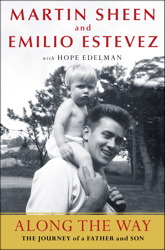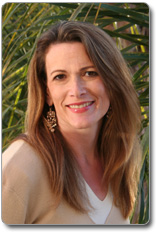Ever since I read Shirley MacLaine’s 2001 book The Camino about her walking the Camino de Santiago – a 500-mile pilgrimage in northern Spain – alone when she was in her sixties, I’ve been fascinated with this spiritual trek. When I saw that Emilio Estevez had written, directed, and acted in a movie about the Camino with his father, Martin Sheen, in the lead, I knew The Way would be the next movie in my viewing queue. Then I saw that a book came out of the experience, a father-son memoir that promised to be extraordinary. I knew it had to be true because Hope Edelman wove it together. If you haven’t read Hope’s work, you should. If you have, you’ll be thrilled to hear her speak candidly about writing Along the Way.
Q: How did this project come about?
I was originally contacted by my agent asking if I’d be interested in walking the Camino de Santiago pilgrimage route across northern Spain with Martin Sheen and Emilio Estevez and help them write a book about the journey. Who would possibly pass that up? I went to their houses in Malibu to meet them, and we got along very quickly. As the next few months unfolded, it became impossible for the guys to make the trip because of other obligations, but they asked if I’d still be interested in helping them write a more traditional father-son memoir. From the start we set out to write a literary memoir that would be a step (or two) above the typical celebrity memoir, and I feel we achieved that.
Q: I was amazed at the detailed recall of both Martin and Emilio. The section on the infamous, arduous filming of Apocalypse Now in the Philippines in the 1970s made me want to see the movie again. (The Estevez family — four children and mom — was there to witness their father go so far into his character and his drinking that he had a breakdown, much of it on-camera.) Was all of it from memory or had they kept journals?
I know, isn’t it incredible? They relied almost exclusively on their memories, plus whatever research I could fill in for them on my own. I, too, was amazed by their powers of recall, especially for events that took place thirty years ago or more. I fact checked everything they said that could be verified, and can report that they recalled events correctly, down to the smallest details, about 95 percent of the time. Very impressive.
Q: As someone who teaches memoir workshops but usually writes her own stories, what were the challenges and surprises of writing Along the Way?
The biggest challenge was learning how to transform someone’s spoken words into an artistically shaped narrative. I had to create a literary version of each man’s spoken voice. Because there were two of them, the voices had to be different enough to represent two different people but similar enough that they read as if they belonged in the same book. One big surprise was how forthcoming these guys were. It takes a lot of courage to write a memoir that portrays oneself from every angle, even the unflattering ones. The men were unflinching in their honesty. I didn’t expect that at first and I came to respect it greatly over time.
Q: Have you walked, or ever desired to walk, the Camino?
To be honest, I didn’t know much about the Camino before I started working on the book. I had a writer friend who’d written a book about her journey along the path, but I’d probably read it six or seven years earlier. I did very much hope to walk at least part of it in 2011, since I’d had the opportunity earlier in the year to visit both Jerusalem and Rome. I thought it would be kind of wonderful to visit all three of the most sacred Catholic sites in the same year. But finishing the book became more of a priority than travel, and I didn’t get to do the walk last year. I’m not entirely sure my back will hold up for long under the weight of a forty-pound backpack, but I still dream of walking the Camino some day.
Q: What are you working on now?
I’m working on several short pieces that I’ve either been contracted to write or have had in the pipeline for a while. I’m waiting for the right next book to find me. Before Along the Way I wrote mostly personal stories about mother-daughter relationships and family issues, but now my oldest daughter has reached the age where she doesn’t want me to write about her any more, and I want to respect that. So I’m focusing more on experiences I had in the years before she was born. It means I’ll run the distinct risk of becoming a middle-aged woman obsessed with her own adolescence, but at least I’ll have a good relationship with my kid.


 Anne L says
Anne L says
July 13, 2012 at 7:21 pmI didn’t realize that people didn’t write their own memoirs. It seems kind of odd for someone else to listen to their words and then write then down using their own language. Thought this was basically all Martin and Emilio’s work.